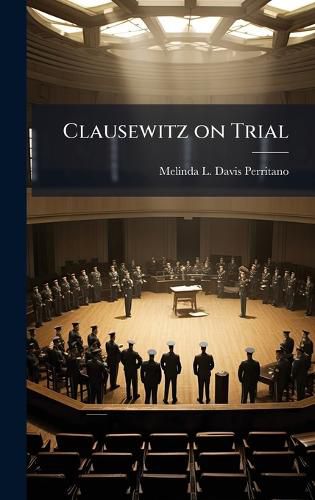Readings Newsletter
Become a Readings Member to make your shopping experience even easier.
Sign in or sign up for free!
You’re not far away from qualifying for FREE standard shipping within Australia
You’ve qualified for FREE standard shipping within Australia
The cart is loading…






Major General Carl von Clausewitz's contributions to the world were not displayed through brilliant military maneuvers on the battlefield, but rather through his thoughts inscribed on paper. Clausewitz published numerous writings based on his lifelong study of history and war exploring the relationship between war and politics and the interplay of forces both internal and external to warfare. War and litigation share a similar relationship in conflict resolution--perhaps the type of relationship Clausewitz would have sought to explore and think about had he lived in the twentieth century age of litigation. Just as Clausewitz helps the Airman, Soldier, Sailor, Marine, and Guardsman think about war, Clausewitz also helps the trial counsel think about the practice of litigation--both inside and outside of the courtroom. The study of military strategy, theory and thought provides the trial counsel an intellectual foundation from which to pursue their own ideas about litigation. The trial counsel should explore and study warfare as a means of developing an analytical framework for their advocacy. Trial counsel should establish a particular way of thinking about litigation that traverses the entire litigation process from pretrial to post trial. Every tactical move a counsel makes, whether it is in discovery, charging, or in motion practice, should have a strategic link to its client's objectives.
This work has been selected by scholars as being culturally important, and is part of the knowledge base of civilization as we know it. This work was reproduced from the original artifact, and remains as true to the original work as possible. Therefore, you will see the original copyright references, library stamps (as most of these works have been housed in our most important libraries around the world), and other notations in the work.
This work is in the public domain in the United States of America, and possibly other nations. Within the United States, you may freely copy and distribute this work, as no entity (individual or corporate) has a copyright on the body of the work.
As a reproduction of a historical artifact, this work may contain missing or blurred pages, poor pictures, errant marks, etc. Scholars believe, and we concur, that this work is important enough to be preserved, reproduced, and made generally available to the public. We appreciate your support of the preservation process, and thank you for being an important part of keeping this knowledge alive and relevant.
$9.00 standard shipping within Australia
FREE standard shipping within Australia for orders over $100.00
Express & International shipping calculated at checkout
Stock availability can be subject to change without notice. We recommend calling the shop or contacting our online team to check availability of low stock items. Please see our Shopping Online page for more details.
Major General Carl von Clausewitz's contributions to the world were not displayed through brilliant military maneuvers on the battlefield, but rather through his thoughts inscribed on paper. Clausewitz published numerous writings based on his lifelong study of history and war exploring the relationship between war and politics and the interplay of forces both internal and external to warfare. War and litigation share a similar relationship in conflict resolution--perhaps the type of relationship Clausewitz would have sought to explore and think about had he lived in the twentieth century age of litigation. Just as Clausewitz helps the Airman, Soldier, Sailor, Marine, and Guardsman think about war, Clausewitz also helps the trial counsel think about the practice of litigation--both inside and outside of the courtroom. The study of military strategy, theory and thought provides the trial counsel an intellectual foundation from which to pursue their own ideas about litigation. The trial counsel should explore and study warfare as a means of developing an analytical framework for their advocacy. Trial counsel should establish a particular way of thinking about litigation that traverses the entire litigation process from pretrial to post trial. Every tactical move a counsel makes, whether it is in discovery, charging, or in motion practice, should have a strategic link to its client's objectives.
This work has been selected by scholars as being culturally important, and is part of the knowledge base of civilization as we know it. This work was reproduced from the original artifact, and remains as true to the original work as possible. Therefore, you will see the original copyright references, library stamps (as most of these works have been housed in our most important libraries around the world), and other notations in the work.
This work is in the public domain in the United States of America, and possibly other nations. Within the United States, you may freely copy and distribute this work, as no entity (individual or corporate) has a copyright on the body of the work.
As a reproduction of a historical artifact, this work may contain missing or blurred pages, poor pictures, errant marks, etc. Scholars believe, and we concur, that this work is important enough to be preserved, reproduced, and made generally available to the public. We appreciate your support of the preservation process, and thank you for being an important part of keeping this knowledge alive and relevant.